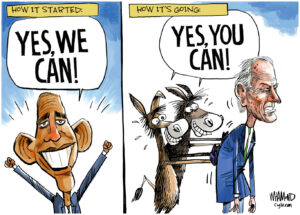A Challenge Obama Should Accept
McCain has invited his rival to join him in a "town hall" tour. That would provide a forum for discussing the economy and for looking at just who has helped ease Americans' pocketbook troubles in the past.To his credit, John McCain has invited Barack Obama to join him in a national “town hall” tour over the coming months, without the unneeded intrusion of celebrity journalists, network extravaganzas and all of their irrelevant impertinence. The Arizona Republican insists that he wants a serious debate over the competing ideas and visions of the two parties, rather than the usual petty focus on process issues and gotcha questions.
After so many election cycles dominated by race-baiting, panty-raiding and Swift-boating, voters might feel reassured by serious discussion of real issues. On no issue is such frank partisan discussion more urgent than the economy, as the numbers plunge downward along with national and world confidence.
Despite McCain’s widely quoted confession that he doesn’t know much about economics, the conceit of his party has long been that only conservatives understand how the world works — and that only cutting taxes on the wealthy and removing regulations from business can encourage growth, especially in recessionary periods.
Many American voters used to accept those simplistic nostrums as received truth, but perhaps it is time to reexamine them in the light of past history and present failures. When it is Obama’s turn to speak in the coming debates, he may wish to point out that the record of past economic performance by Republican politicians compares quite poorly with that of their Democratic rivals.
Take Phil Gramm, the former Texas senator whose proud authorship of the Reagan tax cuts in 1981 was immediately followed by severe recession and then by the largest peacetime tax increase in American history. Among Gramm’s final speeches in the Senate was an impassioned rant warning that the Clinton economic program would lead to unemployment, inflation and higher deficits. He could not have been more wrong, of course — an embarrassing historical footnote that is significant only because he now serves as chief economic counselor to the McCain campaign.
Working alongside Gramm in the McCain policy shop is Douglas Holtz-Eakin, an economist who claims with a straight face that President Reagan “cut taxes within the context of budget discipline and controls on spending.” That happy memory is utterly false. Moreover, the economy was still in deep trouble when Bill Clinton entered the White House after more than a decade of Republican rule.
Rather than merely score easy debating points off McCain and his ill-chosen advisers, however, Obama could speak more broadly about the stagnation and waste that have resulted from Republican economic policy. He could explain how unfair policies hinder growth. And he shouldn’t hesitate to pillory conservative policymakers for incompetence and irresponsibility.
But what Obama ought to emphasize, consistent with his positive and uplifting appeal, is the excellent economic record of his Democratic forebears during the past century or so. As stewards of the economy, they have consistently bested the Republicans on every important measure, from stock market performance to gross domestic product to job creation to disposable income.
Democrats have always been better at reducing poverty and increasing wages, which may not surprise anyone. But they have also proved superior at keeping inflation low, reducing budget deficits and restraining federal spending. After the scandalous budgeting of the Republican Congress and the Bush administration, perhaps nobody will find those statistics surprising, either.
The Obama advisers reflect the long-standing Democratic consensus, with their commitment to universal health care, Social Security and fiscal stimulus balanced by budgetary responsibility and tax equity. They understand that fairness is the fastest path to renewed and sustainable growth.
As for McCain, who dissented from GOP orthodoxy by voting against the Bush tax cuts in 2001, he recants that heresy almost every day. He once understood that we cannot entrust our financial system to the unregulated avarice of predators like his old pal Charles Keating, symbol of the savings-and-loan debacle. Yet now he parrots the free-market fundamentalism that led to the S&L crisis back then, and to the subprime mortgage disaster today. He proposes the same panaceas he used to deride.
So yes, let’s have a freewheeling debate about how to revitalize the economy and the nation. Let’s hear McCain defend the discredited conventional wisdom of the right, and Obama extol the achievements of the liberal past and the promise of the progressive future. It is hard to imagine a clearer choice.
Joe Conason writes for The New York Observer.
© 2008 Creators Syndicate Inc.
Your support matters…Independent journalism is under threat and overshadowed by heavily funded mainstream media.
You can help level the playing field. Become a member.
Your tax-deductible contribution keeps us digging beneath the headlines to give you thought-provoking, investigative reporting and analysis that unearths what's really happening- without compromise.
Give today to support our courageous, independent journalists.








You need to be a supporter to comment.
There are currently no responses to this article.
Be the first to respond.